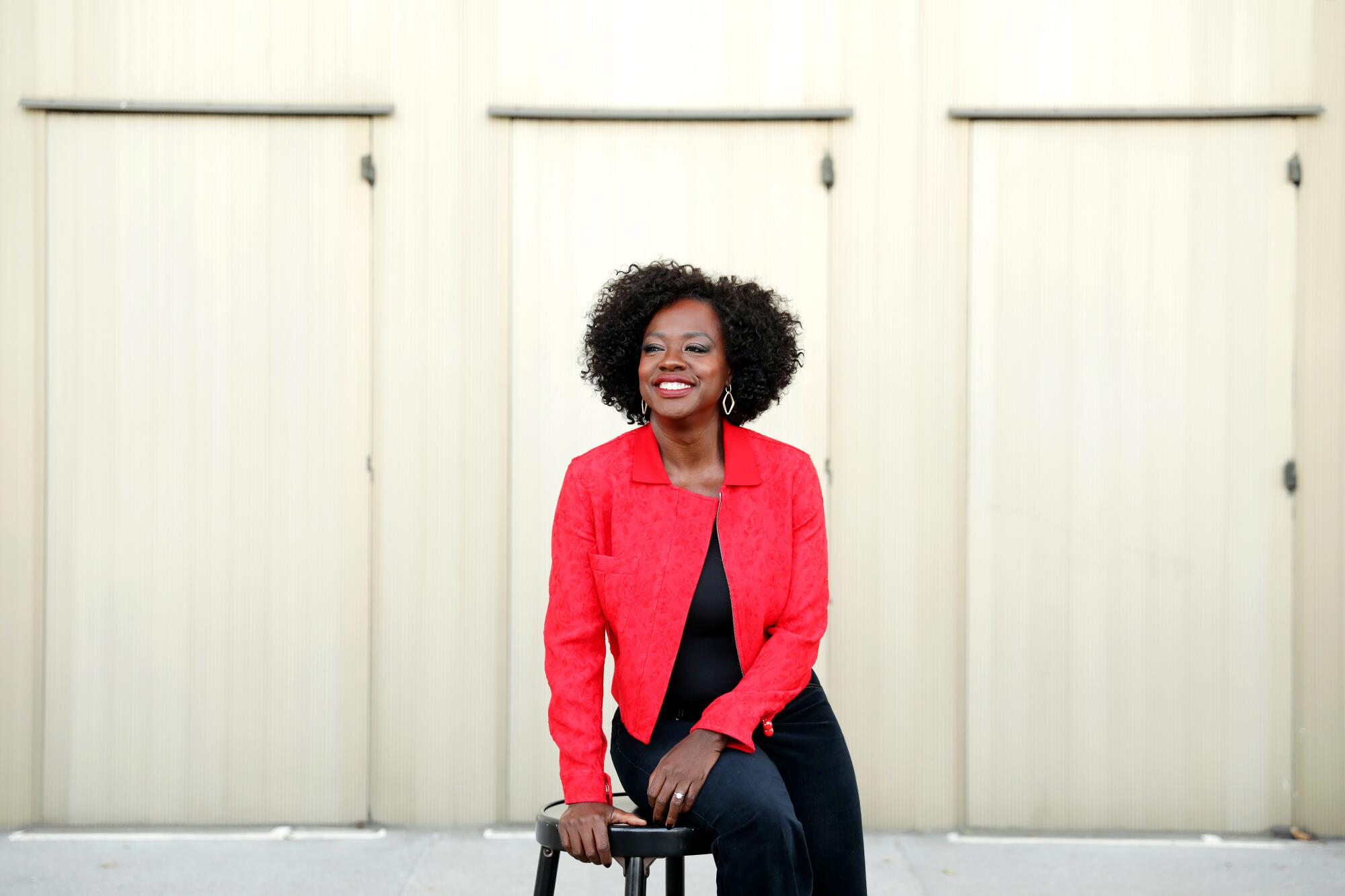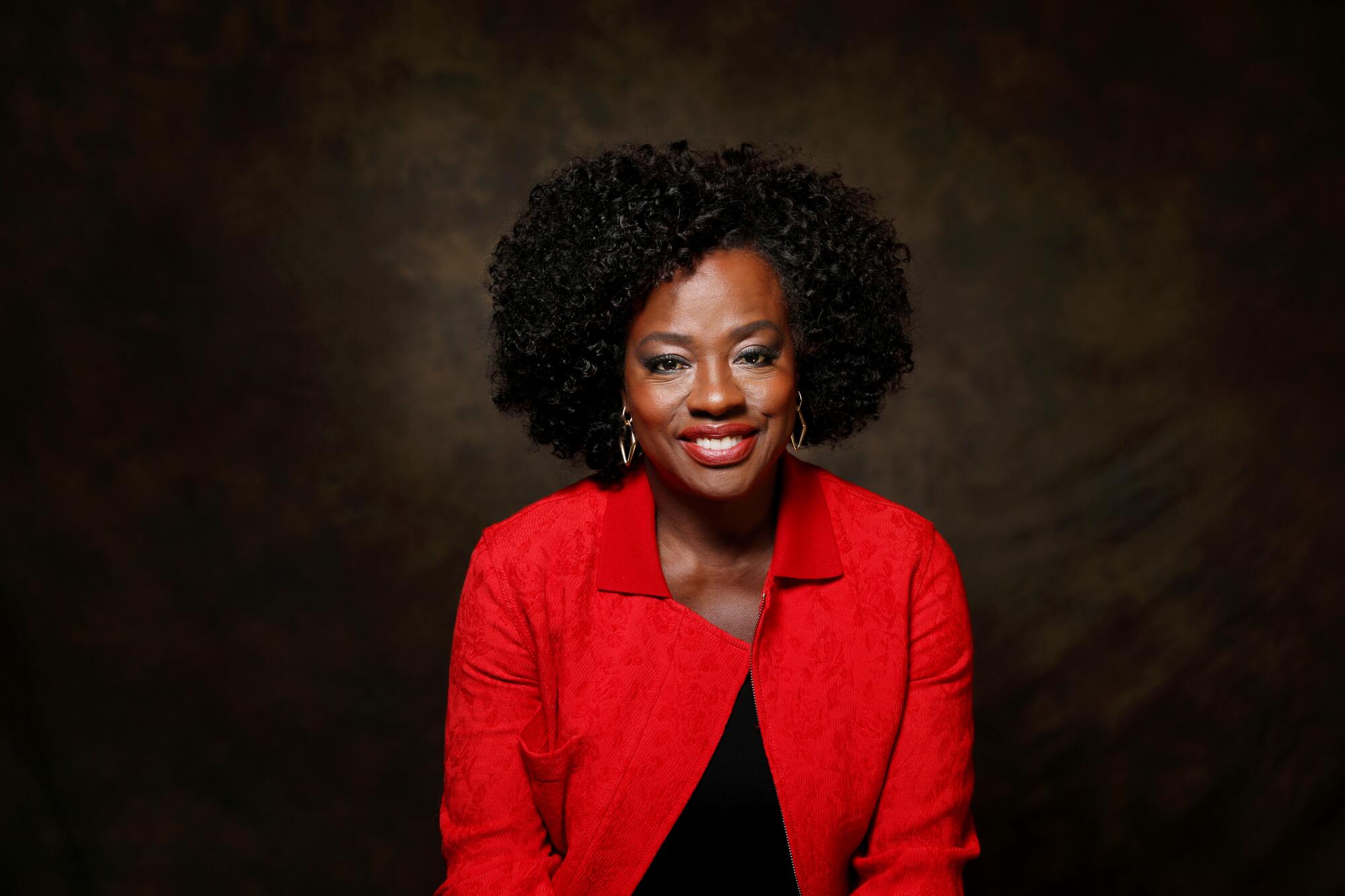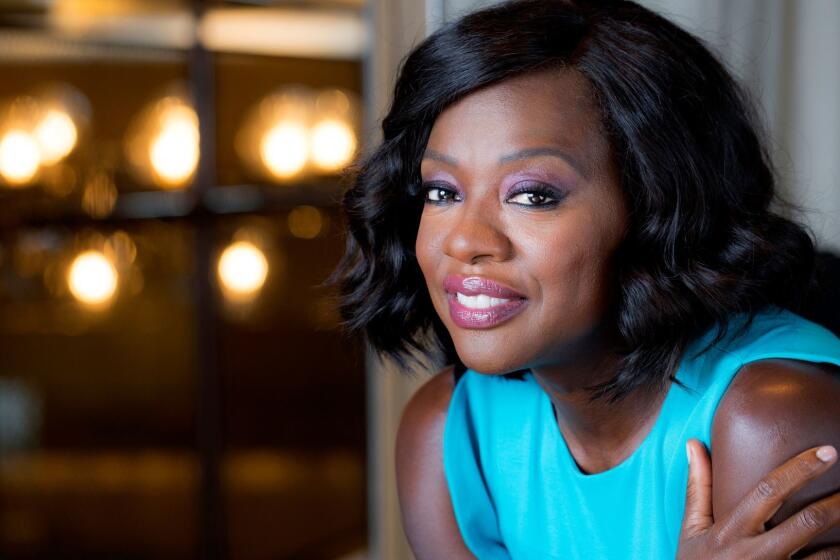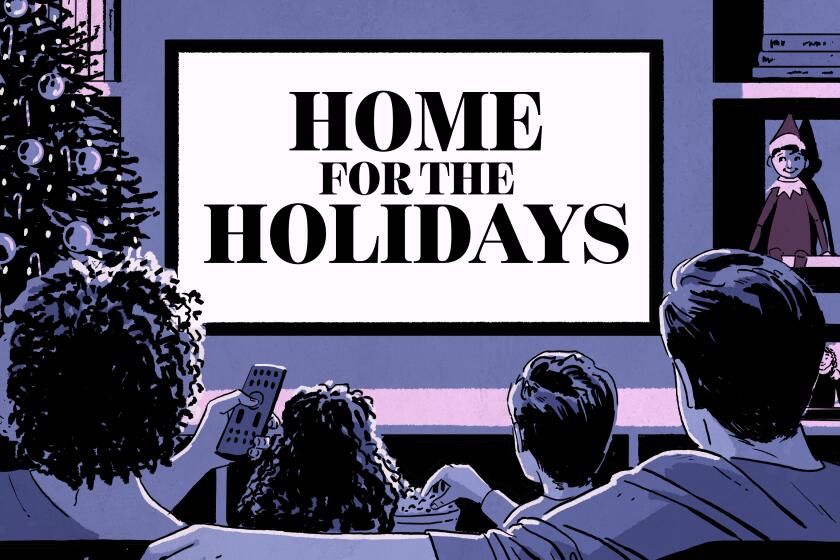
Viola Davis has collected an Academy Award, an Emmy, two Tonys and dozens more acting kudos, and now another powerhouse role has propelled her to the top of the 2021 best actress Oscar race: Gertrude “Ma” Rainey, the unapologetically brash real-life Southern blues singer at the center of a tempestuous 1927 Chicago recording session in the August Wilson adaptation “Ma Rainey’s Black Bottom.”
It’s a juicy role that has landed Davis in the Oscar conversation along with her costar, the late Chadwick Boseman, who dazzles in his final performance as a hotheaded young horn player with eyes for Ma’s girlfriend and radical new ideas for Ma’s music. (Netflix unveils the film in a limited theatrical run Nov. 25 and begins streaming it Dec. 18.) But even the formidable Davis admits she wasn’t initially sure she could pull off the swaggering blues legend.
“There’s a typecasting that happens in the business, and after a while you start to typecast yourself and think of 50 million other people who could have played the role,” says Davis, 55, whose six-season, Emmy-winning star turn on the ABC hit drama “How To Get Away With Murder” concluded earlier this year. “But that’s not what acting is. It’s a transformative art form. It’s about taking whatever you have and using it to transform into a character that is completely different than you.”
She typecasted herself, Davis says — until she stopped comparing herself to other actresses and embraced the challenge. Denzel Washington, who starred opposite and directed Davis in 2016’s “Fences,” never doubted that she could fill Rainey’s shoes. “Viola can do anything,” says Washington, a producer on “Ma Rainey.” “There was no question that she could do it. She’s a once-in-a-generation talent.”
There was no question that she could do it. She’s a once-in-a-generation talent.
— Denzel Washington on Viola Davis
Speaking during the election weekend, Davis feels newly energized by Vice President-elect Kamala Harris’ trailblazing entry to the White House. “I think hope rings eternal these days because without hope, there’s death,” she says. “Certainly the first Black female vice president gives me an extraordinary level of hope, because also what is always on my agenda is elevating Black women.”
That objective, she adds, is very much at the forefront of the roles she chooses and the projects she produces through JuVee Productions, the company she runs with husband and fellow actor Julius Tennon. And it’s a goal that’s dovetailed with the Wilson works that have brought particular acclaim to her career.
In 2010, she starred with Washington in the Broadway revival of the playwright’s Pulitzer-winning “Fences,” which scored 10 Tony nominations and won three, including acting trophies for both stars. Six years later, with Washington at the helm, Davis reprised the role of dutiful 1950s housewife Rose Maxson in the film version and won her first Academy Award. (She was previously nominated for for 2008’s “Doubt” and 2011’s “The Help.”)
Back in 2001, Davis won her first Tony for “King Hedley II,” another title in Wilson’s 10-play “Century Cycle” spanning different decades of 20th century African American life. (Washington plans to produce all 10 plays for the screen, continuing next with “The Piano Lesson.”) Wilson’s impact is of major significance to Davis, who also executive produced the upcoming Netflix documentary “Giving Voice,” about an annual speech competition dedicated to the Pulitzer Prize-winning playwright’s legacy.

“August Wilson was basically a griot, which in Africa were historians, storytellers, praise singers, poets, who kept the history alive in the tribes,” she says of Wilson, who died in 2005. “They kept our stories alive. And that’s what August Wilson was — a griot. And what makes him powerful is that he’s ours. He belongs to the African American community. He wrote to elevate us. To elevate our humor. To elevate our beauty. To elevate our pain. To elevate our complexity, and to elevate ultimately who we were in every decade of life.
“If you are 11 years old to 90, there is a role in each one of his plays that an African American actor or actress can play. Complicated roles. Great roles,” Davis adds. “There’s a sense that if you are an African American artist and you just do works by African American writers, then you’re limited. He blew a hole through all of that for Black artists, for our history, for our lives, for our pathology. He introduced us to the world.”
If Viola Davis has learned anything in the near 30 years since she graduated from Juilliard, it’s that you don’t play games with August Wilson, the work or the man.
In “Ma Rainey,” Davis sinks her teeth into the title character’s grandiosity with nuance and rings even her triumphs with a bruising, melancholy aftertaste. An openly queer Black songstress defiant of the bigotry of the era, Ma Rainey demands her due from all who cross her path, from the strangers whose hostile glares she returns while parading her much-younger girlfriend (Taylour Paige) on her arm, to the bickering members of her band (Colman Domingo, Michael Potts, Glynn Turman and Boseman) and the white managers (Jeremy Shamos, Jonny Coyne) trying to squeeze another hit record out of her on the cheap.
As the day unfolds, Ma tangles with her recording execs and the band spins yarns and trades barbs in a basement practice room. The ensuing symphony of microaggressions and melodrama is deceptively mundane; swirling tensions reach a fever pitch over a musical arrangement, a stutter and an ice-cold bottle of Coca-Cola. Filmed last summer in Pittsburgh in a soundstage transformed into a sweltering Chicago recording studio, “Ma Rainey’s Black Bottom” — titled after the hit song that becomes hotly contested over the course of the chaotic afternoon — left Davis invigorated.
[Ma Rainey] was unapologetic about her worth and her power. She’s constantly reminding people who she is, and that had a transformative effect on me too.
— Viola Davis
In Rainey she found an artist whose battles hit close to home. “She was a woman who was unapologetic about her worth and her power. She’s constantly reminding people who she is, and that had a transformative effect on me too,” says Davis. “That’s what happens a lot in our profession: You’re always hustling for your worth. That’s what you’re constantly doing in this business and in this world, so it felt very liberating to play a woman who was not doing that.”
Donning a rubber suit and a horsehair wig, her skin slicked with sweat, Davis revels in Rainey’s physicality, outfitted in period dress and furs by costume designer Ann Roth. When Ma sings, resplendent in her gold teeth and greasepaint makeup, the aches and joys of living reverberate within her all at once. (Aside from one song sung by Davis, vocals are courtesy of singer Maxayn Lewis.) And when Ma fumes over slights dealt to herself or those in her care — well, no man wants to find himself in the path of that train.
Researching such a singular historical figure was no easy feat, says director George C. Wolfe, considering that only “six or seven” photographs of the real Rainey exist today. Unlike contemporaries like Bessie Smith, Rainey was not considered glamorous or anointed by white mainstream media, which led to inspired set decoration: a 1926 Vanity Fair article celebrating Ma’s musical rivals sits next to her in one of the character’s more emotionally revealing scenes. “I just wanted it sitting there, haunting Ma without her even necessarily being aware of it,” Wolfe teases.
Instead, Davis drew on Wilson’s text, adapted for the screen by playwright and actor Ruben Santiago-Hudson, and searched within to understand who Rainey was. “What I have to rely on is my life experience, because therein lies the problem: Ma Rainey is considered the Mother of the Blues but finding any material about Ma Rainey was very difficult,” she says.

She thought of her aunts, her mother, her grandmother and of women spiritually in tune with Rainey — “someone who could be at a bar on Tuesday and beating up a 200-pound man, to an orgy on Thursday and be arrested by the police and thrown in jail, to church on Sunday! I understand the emotional life of those people because they’re in my life — those complicated, beautiful, funny, hardcore, unapologetic people have been in my life forever.”
But Ma also has a surprisingly tender side reserved for her nephew Sylvester (Dusan Brown), whose career she’s promised to help, and for her lover Dussie Mae, who is secretly more than a little receptive to Levee’s (Boseman) flirtations. Her truest moments of vulnerability, however, are shared with her bandleader and trombonist Cutler (Domingo), with whom she briefly drops the exhausting veil of toughness she dons in most aspects of her life.
“They don’t care nothing about me,” she tells him as they sit quietly and alone, clear-eyed about her position within a system of power that will discard her once she’s deemed no longer profitable. “All they want is my voice.”
Domingo describes an unusually intensive two-week rehearsal period the cast had in which they pored over the script in meticulous detail, “as if we were a theater company.” “We talked about the idea that Ma and Cutler have a closeness that they don’t have with the rest of the band. She was a pioneer, she was very much a maverick — and what she did was she empowered the men in her band as well.”
By contrast, Davis conjures a prickly dynamic with Boseman as Levee, whose youthful arrogance and newer, jazzier style represent a looming threat to Ma’s authority. After playing mother and son in 2014’s “Get On Up,” the duo wage a battle of wills as adversaries in “Ma Rainey,” which Davis calls a “fitting denouement” to Boseman’s cinematic legacy.
“Levee is probably one of the greatest, if not the greatest role for an African American man, ever, because it absolutely encapsulates them — their pain, their vision, their dreams, their talent,” she says, noting the rare artistry such a character allows Black actors to explore. “It’s like someone who has a great figure who has to wear a burlap sack; this is an artist being fitted with an August Wilson garment that couldn’t have been more perfect. And he wore it beautifully. He just played the role beautifully.”
Davis is next preparing and researching another role based on a real person: Michelle Obama, whom she’ll portray in “First Ladies,” a Showtime limited series she and Tennon will executive produce. Then she’ll costar in and produce “The Woman King” with “The Old Guard” helmer Gina Prince-Bythewood directing, about the female warriors of the Agoji tribe in West Africa, which she’s already begun training for. “I have always wanted to have a Black female ‘Braveheart,’ and this is what that is,” she says.
Davis is bringing the lessons of Rainey with her as she continues to forge her own path in Hollywood. Centering stories like those on her producing slate “is always at the forefront of everything that I do,” Davis says. “When you ask me what’s on my agenda — silently, blatantly — it’s absolutely part of my agenda.”
2020: Just sayin’ — the year doesn’t automatically bring to mind happy thoughts as we head into the home stretch.
More to Read
Only good movies
Get the Indie Focus newsletter, Mark Olsen's weekly guide to the world of cinema.
You may occasionally receive promotional content from the Los Angeles Times.













